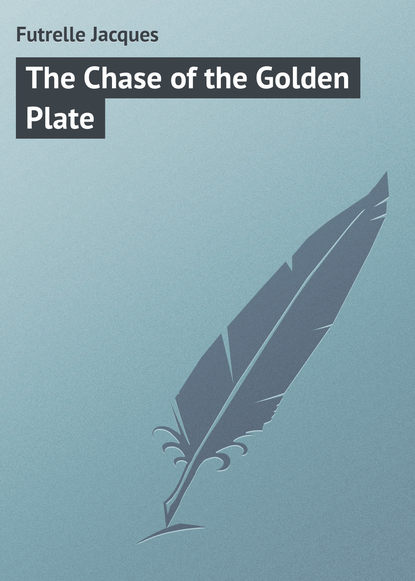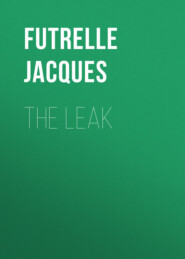По всем вопросам обращайтесь на: info@litportal.ru
(©) 2003-2024.
✖
The Chase of the Golden Plate
Автор
Год написания книги
2017
Настройки чтения
Размер шрифта
Высота строк
Поля
CHAPTER I
Professor Augustus S. F. X. Van Dusen, Ph. D., LL. D., F. R. S., M. D., etc., etc., was the Court of Last Appeal in the sciences. He was five feet two inches tall, weighed 107 pounds, that being slightly above normal, and wore a number eight hat. Bushy, yellow hair straggled down about his ears and partially framed a clean-shaven, wizened face in which were combined the paradoxical qualities of extreme aggressiveness and childish petulance. The mouth drooped a little at the corners, being otherwise a straight line; the eyes were mere slits of blue, squinting eternally through thick spectacles. His brow rose straight up, domelike, majestic even, and added a whimsical grotesqueness to his appearance.
The Professor's idea of light literature, for rare moments of recreation, was page after page of encyclopædic discussion on "ologies" and "isms" with lots of figures in 'em. Sometimes he wrote these discussions himself, and frequently held them up to annihilation. His usual speaking tone was one of deep annoyance, and he had an unwavering glare that went straight through one. He was the son of the son of the son of an eminent German scientist, the logical production of a house that had borne a distinguished name in the sciences for generations.
Thirty-five of his fifty years had been devoted to logic, study, analysis of cause and effect, mental, material, and psychological. By his personal efforts he had mercilessly flattened out and readjusted at least two of the exact sciences and had added immeasurably to the world's sum of knowledge in others. Once he had held the chair of philosophy in a great university, but casually one day he promulgated a thesis that knocked the faculty's eye out, and he was invited to vacate. It was a dozen years later that that university had openly resorted to influence and diplomacy to induce him to accept its LL. D.
For years foreign and American institutions, educational, scientific, and otherwise, crowded degrees upon him. He didn't care. He started fires with the elaborately formal notifications of these unsought honours and turned again to his work in the small laboratory which was a part of his modest home. There he lived, practically a recluse, his simple wants being attended to by one aged servant, Martha.
This, then, was The Thinking Machine. This last title, The Thinking Machine, perhaps more expressive of the real man than a yard of honorary initials, was coined by Hutchinson Hatch at the time of the scientist's defeat of a chess champion after a single morning's instruction in the game. The Thinking Machine had asserted that logic was inevitable, and that game had proven his assertion. Afterward there had grown up a strange sort of friendship between the crabbed scientist and the reporter. Hatch, to the scientist, represented the great, whirling outside world; to the reporter the scientist was merely a brain – a marvellously keen, penetrating, infallible guide through material muddles far removed from the delicately precise labours of the laboratory.
Now The Thinking Machine sat in a huge chair in his reception-room with long, slender fingers pressed tip to tip and squint eyes turned upward. Hatch was talking, had been talking for more than an hour with infrequent interruptions. In that time he had laid bare the facts as he and the police knew them from the incidents of the masked ball at Seven Oaks to the return of Dollie Meredith.
"Now, Mr. Hatch," asked The Thinking Machine, "just what is known of this second theft of the gold plate?"
"It's simple enough," explained the reporter. "It was plain burglary. Some person entered the Randolph house on Monday night by cutting out a pane of glass and unfastening a window-latch. Whoever it was took the plate and escaped. That's all anyone knows of it."
"Left no clew, of course?"
"No, so far as has been found."
"I presume that, on its return by express, Mr. Randolph ordered the plate placed in the small room as before?"
"Yes."
"He's a fool."
"Yes."
"Please go on."
"Now the police absolutely decline to say as yet just what evidence they have against Herbert beyond the finding of the plate in his possession," the reporter resumed, "though, of course, that's enough and to spare. They will not say, either, how they first came to connect him with the affair. Detective Mallory doesn't – "
"When and where was Mr. Herbert arrested?"
"Yesterday, Tuesday, afternoon in his rooms. Fourteen pieces of the gold plate were on the table."
The Thinking Machine dropped his eyes a moment to squint at the reporter.
"Only eleven pieces of the plate were first stolen, you said?"
"Only eleven, yes."
"And I think you said two shots were fired at the thief?"
"Yes."
"Who fired them, please?"
"One of the detectives – Cunningham, I think."
"It was a detective – you know that?"
"Yes, I know that."
"Yes, yes. Please go on."
"The plate was all spread out – there was no attempt to conceal it," Hatch resumed. "There was a box on the floor and Herbert was about to pack the stuff in it when Detective Mallory and two of his men entered. Herbert's servant, Blair, was away from the house at the time. His people are up in Nova Scotia, so he was alone."
"Nothing but the gold plate was found?"
"Oh, yes!" exclaimed the reporter. "There was a lot of jewelry in a case and fifteen or twenty odd pieces – fifty thousand dollars' worth of stuff, at least. The police took it to find the owners."
"Dear me! Dear me!" exclaimed The Thinking Machine. "Why didn't you mention the jewelry at first? Wait a minute."
Hatch was silent while the scientist continued to squint at the ceiling. He wriggled in his chair uncomfortably and smoked a couple of cigarettes before The Thinking Machine turned to him and nodded.
"That's all I know," said Hatch.
"Did Mr. Herbert say anything when arrested?"
"No, he only laughed. I don't know why. I don't imagine it would have been at all funny to me."
"Has he said anything since?"
"No, nothing to me or anybody else. He was arraigned at a preliminary hearing, pleaded not guilty, and was released on twenty thousand dollars bail. Some of his rich friends furnished it."
"Did he give any reason for his refusal to say anything?" insisted The Thinking Machine testily.
"He remarked to me that he wouldn't say anything, because, even if he told the truth, no one would believe him."
"If it should have been a protestation of innocence I'm afraid nobody would have believed him," commented the scientist enigmatically. He was silent for several minutes. "It could have been a brother, of course," he mused.
"A brother?" asked Hatch quickly. "Whose brother? What brother?"
"As I understand it," the scientist went on, not heeding the question, "you did not believe Herbert guilty of the first theft?"
"Why, I couldn't," Hatch protested. "I couldn't," he repeated.
"Why?"
"Well, because – because he's not that sort of man," explained the reporter. "I've known him for years, personally and by reputation."
"Was he a particular friend of yours in college?"
"No, not an intimate, but he was in my class – and he's a whacking, jam-up, ace-high football player." That squared everything.
"Do you now believe him guilty?" insisted the scientist.







